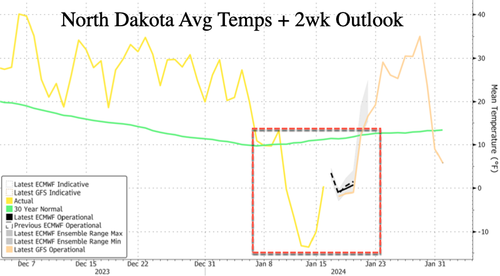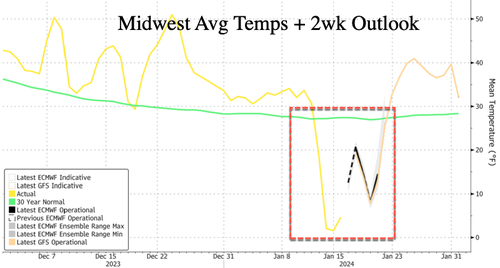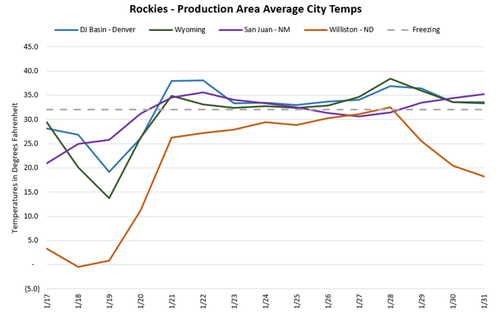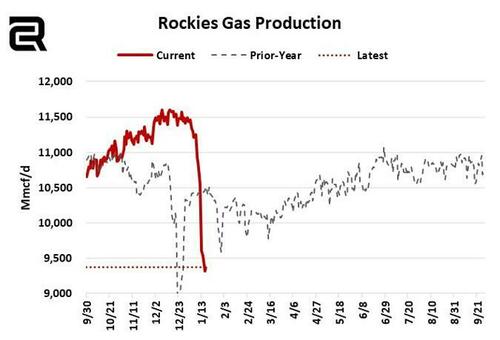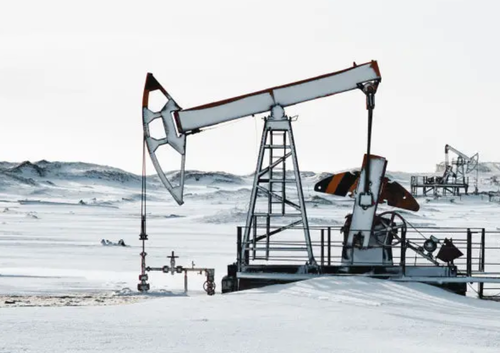
Bone-chilling temperatures in the US Midwest have forced oil and gas producers in North Dakota to curb output because of operational disruptions stemming from freeze-offs and shut-ins.
Bloomberg reports 650,000 to 700,000 barrels of oil output a day have been taken offline. The state, home to the Bakken shale formation, produced 1.2 million barrels a day on average in October.
Average temperatures across the state have averaged below zero for nearly a week. The good news: Temps are expected to rise to 30-year norms by the end of the month, but forecasts at the moment show another possible cold blast slated for early Feb.
Average temps across the Midwest region are expected to rise from about zero to the 30-year trend of around 30F by next week.
In natural gas markets, energy research firm Criterion Research said Rockies NatGas production is set to return to normal levels following operational disruptions.
Within the Rockies production areas, temperatures remain brutally cold in the Williston Basin for the next three days. The DJ Basin (Colorado/Wyoming) will see a return to the 15-20F range as well by the end of the week, whereas San Juan/New Mexico temps gradually warm into the weekend.
As of today, Rockies supply levels remain at lows of 9.36 Bcf/d.
Besides disruptions to oil and NatGas production, several power grids have been under strain because cold weather has boosted heating demand to record highs. Texas's power grid had issues earlier this week, while the Tennessee Valley Authority asked customers Wednesday morning to conserve power.
Also, in Texas, critical energy export terminals in the Gulf were disrupted earlier this week due to the cold.
News today: Motiva Enterprises' Port Arthur Refinery, the largest oil refinery in North America, with a capacity of 630,000 barrels per day, in Port Arthur, Texas, suffered disruptions due to cold weather.
Winter storm throttles US shale production, causing power outages, refinery shutdowns, and production stoppages—taking hundreds of thousands of barrels offline.
— OPEC News+ (@OPECnews) January 17, 2024
TotalEnergy’s Port Arthur (Texas) refinery faces power outage, as North Dakota’s output is halved.
Someone needs to tell the unelected officials at WEF that folks in the Western Hemisphere would like more global warming ASAP.
Bone-chilling temperatures in the US Midwest have forced oil and gas producers in North Dakota to curb output because of operational disruptions stemming from freeze-offs and shut-ins.
Bloomberg reports 650,000 to 700,000 barrels of oil output a day have been taken offline. The state, home to the Bakken shale formation, produced 1.2 million barrels a day on average in October.
Average temperatures across the state have averaged below zero for nearly a week. The good news: Temps are expected to rise to 30-year norms by the end of the month, but forecasts at the moment show another possible cold blast slated for early Feb.
Average temps across the Midwest region are expected to rise from about zero to the 30-year trend of around 30F by next week.
In natural gas markets, energy research firm Criterion Research said Rockies NatGas production is set to return to normal levels following operational disruptions.
Within the Rockies production areas, temperatures remain brutally cold in the Williston Basin for the next three days. The DJ Basin (Colorado/Wyoming) will see a return to the 15-20F range as well by the end of the week, whereas San Juan/New Mexico temps gradually warm into the weekend.
As of today, Rockies supply levels remain at lows of 9.36 Bcf/d.
Besides disruptions to oil and NatGas production, several power grids have been under strain because cold weather has boosted heating demand to record highs. Texas’s power grid had issues earlier this week, while the Tennessee Valley Authority asked customers Wednesday morning to conserve power.
Also, in Texas, critical energy export terminals in the Gulf were disrupted earlier this week due to the cold.
News today: Motiva Enterprises’ Port Arthur Refinery, the largest oil refinery in North America, with a capacity of 630,000 barrels per day, in Port Arthur, Texas, suffered disruptions due to cold weather.
Winter storm throttles US shale production, causing power outages, refinery shutdowns, and production stoppages—taking hundreds of thousands of barrels offline.
TotalEnergy’s Port Arthur (Texas) refinery faces power outage, as North Dakota’s output is halved.
— OPEC News+ (@OPECnews) January 17, 2024
Someone needs to tell the unelected officials at WEF that folks in the Western Hemisphere would like more global warming ASAP.
Loading…
